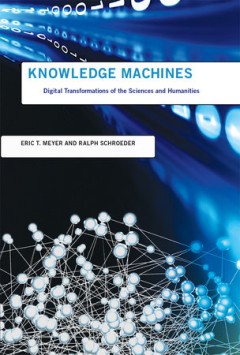Filter by

Crowdsourced health :how what you do on the Internet will improve medicine
Most of us have gone online to search for information about health. What are the symptoms of a migraine? How effective is this drug? Where can I find more resources for cancer patients? Could I have an STD? Am I fat? A Pew survey reports more than 80 percent of American internet users have logged on to ask questions like these. But what if the digital traces left by our searches could show doct…
- Edition
- -
- ISBN/ISSN
- 9780262334808
- Collation
- 1 online resource (144 pages)
- Series Title
- -
- Call Number
- -

Knowledge Machines: Digital Transformations of the Sciences and Humanities
In Knowledge Machines, Eric Meyer and Ralph Schroeder argue that digital technologies have fundamentally changed research practices in the sciences, social sciences, and humanities. Meyer and Schroeder show that digital tools and data, used collectively and in distributed mode -- which they term e-research -- have transformed not just the consumption of knowledge but also the production of know…
- Edition
- -
- ISBN/ISSN
- 9780262328180
- Collation
- 1 online resource (x, 271 pages) :illustrations.
- Series Title
- -
- Call Number
- -

The joy of search :a Google insider's guide to going beyond the basics
"How to be a great online searcher, demonstrated with step-by-step searches for answers to a series of intriguing questions (for example, "Is that plant poisonous?"). We all know how to look up something online by typing words into a search engine. We do this so often that we have made the most famous search engine a verb: we Google it--"Japan population" or "Nobel Peace Prize" or "poison ivy" …
- Edition
- -
- ISBN/ISSN
- 9780262354721
- Collation
- 1 online resource (xii, 323 pages) :illustrations (chiefly color)
- Series Title
- -
- Call Number
- -

Carnal resonance :affect and online pornography
Here, Susanna Paasonen moves beyond the usual debates over the legal, political, and moral aspects of pornography to address online porn in a media historical framework, investigating its modalities, its affect, and its visceral and disturbing qualities.OCLC-licensed vendor bibliographic record.
- Edition
- -
- ISBN/ISSN
- 0262298813
- Collation
- 1 online resource (x, 321 pages) :illustrations
- Series Title
- -
- Call Number
- -

Digital methods
In Digital Methods, Richard Rogers proposes a methodological outlook for social and cultural scholarly research on the Web that seeks to move Internet research beyond the study of online culture. It is not a toolkit for Internet research, or operating instructions for a software package; it deals with broader questions. How can we study social media to learn something about society rather than …
- Edition
- -
- ISBN/ISSN
- 9781461931867
- Collation
- 1 online resource (274 pages) :illustrations
- Series Title
- -
- Call Number
- -
 Computer Science, Information & General Works
Computer Science, Information & General Works  Philosophy & Psychology
Philosophy & Psychology  Religion
Religion  Social Sciences
Social Sciences  Language
Language  Pure Science
Pure Science  Applied Sciences
Applied Sciences  Art & Recreation
Art & Recreation  Literature
Literature  History & Geography
History & Geography